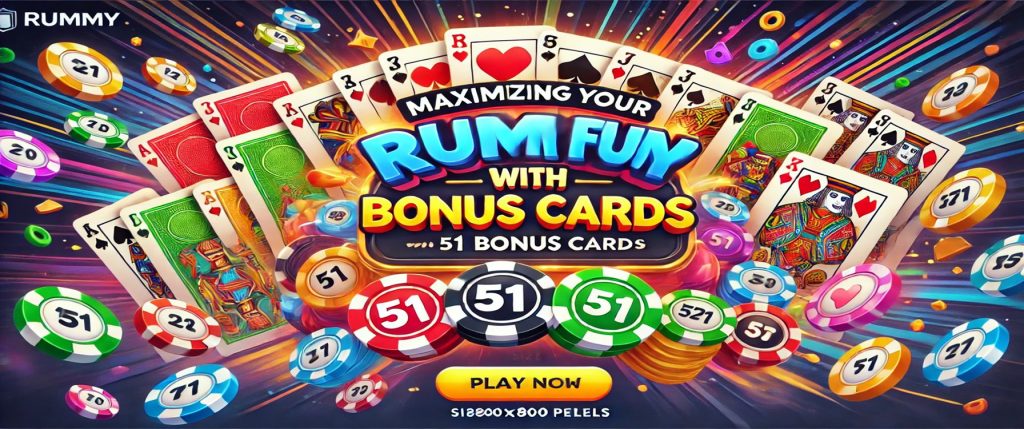
The Intricacies of Rummy: An in-depth look at 51 Bonus Cards Rummy is a popular card game that has enthralled players for many years worldwide. It is favored by both serious competitors and casual players due to its unique combination of skill, strategy, and a little bit of luck. Rummy’s introduction of bonus cards, especially the 51 Bonus Cards variant, is one of its most fascinating features. The gameplay is improved by this addition, which also adds new dynamics that have the potential to drastically change tactics and results. Any player hoping to improve their skills must comprehend these 51 Bonus Cards.
Players have more choices and flexibility when playing because these cards can usually be used as wild or special cards to finish sets or runs. These cards have the ability to drastically alter the outcome of a game, which has significant strategic ramifications. The function of the 51 Bonus Cards can change based on the particular rules that the players choose to follow. These cards can be used to negate the effects of other cards, draw extra cards, or trade cards with opponents in certain variations.
Because of this adaptability, players need to be skilled at creating their own melds as well as understanding how their rivals might take advantage of these bonus cards. It is therefore essential to comprehend the subtleties of each bonus card & how they might affect the game. Gamers who invest the time to become familiar with these cards will be better able to predict their opponents’ moves, make strategic decisions, and improve their overall gaming experience.
Although adding 51 Bonus Cards to your rummy game can be exciting, it takes careful thought and preparation. Setting clear guidelines for how these bonus cards will work before the game begins is a useful tip. This helps to avoid confusion while playing and guarantees that everyone is on the same page. For example, you may determine that some bonus cards can only be used in particular circumstances or that they can only be used once per game. By establishing these guidelines, you can provide a controlled setting free from the confusion of unclear regulations, allowing players to plan their moves efficiently.
The way bonus cards are distributed among players is another crucial factor to take into account. While still permitting individual strategy creativity, a well-balanced approach can improve the game’s competitive aspect. You can decide to let each player draw from a different deck while the game is being played, or you can deal them a set number of bonus cards at the start. The way players approach their hands and interact with one another is impacted by this choice, which can have a big impact on gameplay dynamics.
You can find what suits your group the best and make the experience more interesting by trying out various approaches to adding bonus cards. Strategy for the Early Game. A good tactic is to focus on early in the game on gathering sets and runs that use these bonus cards.
By doing this, you not only improve your chances of creating legitimate melds, but you also open up possibilities to thwart the strategies of your opponents. Active Play. Consider using a bonus card that can function as a wild card, for instance, to finish a high-value run or set that your opponent might be aiming for. Your opponents may feel pressured to reconsider their tactics as a result of this proactive approach.
Also, you can learn a lot about your opponents’ hands by monitoring which bonus cards have been used. Adjusting to the dynamics of the game. An opponent may be keeping a certain bonus card for a calculated move later in the game if you see that it hasn’t been used yet. You can modify your own approach by keeping an eye on these dynamics, possibly playing more aggressively or withholding some cards to trick your opponents into showing their hands.
Ultimately, it takes a combination of foresight, flexibility, and acute observation to make the most of your 51 Bonus Card usage. The addition of 51 Bonus Cards creates intriguing opportunities for brand-new Rummy variations that could revitalize this timeless game. Making themed decks in which every bonus card stands for a distinct skill or action that players can perform during their turn is one such variation. For example, a player may be able to steal a card from an opponent’s hand with one card and receive an additional turn with another.
These thematic components not only give the game more depth, but they also inspire players’ imaginations and strategic thinking. Another creative strategy might be to assign bonus cards points according to their power or rarity. In this version, players would receive points for accomplishing particular goals pertaining to bonus cards or for successfully utilizing those cards in their melds. Players would have to strike a balance between using their bonus cards to the fullest & traditional melds, which could add another level of competition to this point system.
By experimenting with these novel variations, players can maintain the game’s vitality & interest while still taking advantage of the fundamental elements that make Rummy so alluring. A balanced and thrilling 51 Bonus Card Rummy game necessitates careful consideration of player dynamics and gameplay mechanics. A crucial aspect is making sure that the bonus cards don’t take precedence over more conventional gameplay components. The fundamental principles of forming sets and runs should be complemented by these cards rather than overshadowed by them, even though they can offer substantial advantages.
Consider restricting the quantity of bonus cards in play or setting up particular guidelines for their use in order to strike this balance. In this manner, players can strategically use bonus cards while still having to rely on their traditional Rummy skills. Another crucial element is creating an atmosphere where all participants feel involved and challenged.
Promoting candid discussion about tactics and experiences using bonus cards while playing can help achieve this. Gamers should be at ease talking about their strategies and exchanging ideas about how they make good use of these cards. To keep things interesting and novel, think about switching up the roles in your group as well. For example, rotate who sets the house rules for each session or who deals with the cards. You can improve the game’s overall enjoyment by fostering a balanced environment where everyone has a chance to shine.
An intriguing twist that can revitalize the experiences of even the most seasoned players is provided by the addition of 51 Bonus Cards to classic Rummy games. Using these cards in conjunction with special challenges or goals is one way to make use of them. One way to do this would be to design scenarios in which specific bonus cards can only be used during specific rounds or under specific circumstances, like only after a player has achieved a particular score threshold. In order to effectively use their bonus cards, players must consider when and how to use them, which adds a strategic component.
Also, think about adding a “bonus round” where players can get extra points or prizes for creatively using their bonus cards. Completing particular combinations or reaching particular game milestones may be required for this. By rewarding creative bonus card usage, you can inspire players to think creatively & try out novel tactics they might not have otherwise thought of. As players exchange stories and gain knowledge from one another, this twist not only keeps the gameplay interesting but also promotes a sense of community. Clearly defining the rules. For example, you may choose to restrict how many bonus cards each player can use in a round or establish game-specific guidelines regarding when they can be used.
While preserving equity, these rules still permit strategic depth. encouraging imaginative gameplay. Also, think about rewarding players who perform exceptionally well during the tournament with prizes or recognition for their efficient use of bonus cards. Awards for “Best Use of Bonus Cards” or “Most Creative Strategy,” for example, could be included. These prizes encourage players to consider their gameplay critically and provide a sense of enjoyment and competition beyond simply winning games.
establishing an environment that is engaging. You can create an engaging environment that challenges participants and celebrates their skills & creativity by carefully integrating 51 Bonus Cards into tournaments. The social nature of rummy is one of its most alluring features, & the addition of 51 Bonus Cards only serves to heighten this experience. Players frequently engage in animated conversations while planning strategies or exchanging advice on how to use these cards most effectively while playing.
Every session is about more than just winning; it’s also about forming relationships with other players thanks to the interactive component, which promotes friendly competition and camaraderie. Also, adding 51 Bonus Cards to games can result in surprising turns that make players laugh and get excited. The unpredictable nature of these cards’ effects on gameplay keeps players interested and involved in the result of every round.
As players overcome obstacles presented by bonus cards or celebrate shrewd plays that unexpectedly change the course of the game, they may find themselves supporting one another. In the end, enjoying the social elements of Rummy with 51 Bonus Cards enhances the whole experience by turning every game into an unforgettable occasion full of friendly competition and shared joy. To sum up, learning about and using 51 Bonus Cards in Rummy creates a plethora of opportunities to improve gameplay dynamics, encourage creativity, and strengthen player relationships. These extra cards offer depth & excitement that can turn any Rummy session into an unforgettable experience, whether you’re investigating new variations, creating plans for making the most of their use, or just taking pleasure in the interactive elements of this timeless game.




